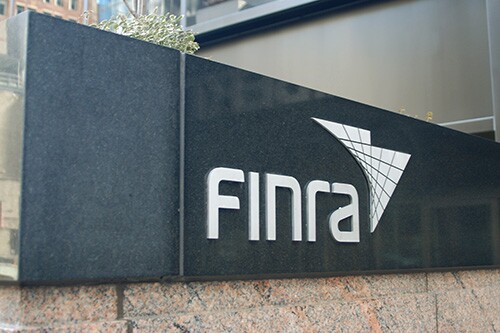FINRA's steady decline in enforcement actions in recent years suggests a "kinder, gentler" stance toward the industry the watchdog agency is charged with policing. Still, a corresponding increase in fines imposed on firms demonstrates that the consequences of running afoul of the law are still high.
Those are two key findings that Adam Pollet, a securities enforcement partner in the Washington, D.C. offices of Eversheds Sutherland, noted in his firm's latest
In its report released on Wednesday, Eversheds Sutherland found that the Financial Industry Regulatory Authority took 453 disciplinary actions in 2023. That number was down 9% from 496 in 2022 and 13% from 569 in 2021.
Pollet said there has been a marked change in FINRA's approach to the industry since Robert Cook became CEO of the agency in 2016. Not long after taking over, Cook went on a
Pollet said the agency has since shown a tendency to try to guide firms on ways to stay on the right side of the law rather than waiting for them to go astray before bringing the hammer down.
"Our working hypothesis is that after Robert Cook took over and committed to his 360-degree review of the agency and talking to folks in the industry, it has resulted in a kinder, gentler FINRA," Pollet said. "And you see that play out in enforcement."
A FINRA spokesman did not immediately respond to requests for comment.
READ MORE:
Tino Lisella, a former FINRA enforcement attorney and a securities lawyer in the West Palm Beach, Florida, office of Carlton Fields, said he thinks there is a greater tendency these days to resolve low-level violations through informal actions that wouldn't necessarily show up in publicly reported data. That's particularly true for regulatory matters that don't harm investors or undermine the integrity of the markets, Lisella said.
FINRA in the past tended to be aggressive about pursuing even small regulatory matters, he said. Nowadays, though, it's "probably not passing over every little footfall to enforcement," Lisella said.
"There are probably a lot of minor violations that are perhaps getting addressed through corrective conferences or a cautionary letter or some other type of informal resolution," he said.
Meanwhile, Eversheds Sutherland's report showed a steep 63% increase in the fine amounts handed down by FINRA. The total rose to $89 million in 2023, from $54.5 million the year before.
Much of that increase was driven by a single charge. In November, FINRA hit Bank of America with a
But even without that fine, the number would be an increase over 2022 fines. Take out the $24 million charge against Bank of America, and FINRA's haul for 2023 would still have risen 19% to $65 million, Eversheds Sutherland's report notes.
"So there is less activity in terms of cases," Pollet said. "But when they do bring them, they're bringing to bear higher fines and penalties."
The Financial Industry Regulatory Authority operates under the Securities and Exchange Commission as the self-regulator of the broker-dealer industry.
Eversheds Sutherland tallied those figures by looking at FINRA's monthly disciplinary reports, press releases and similar online data. FINRA separately releases every year its own disciplinary statistics but has yet to do so for 2023.
For more takeaways from Eversheds Sutherland's report, scroll down.











